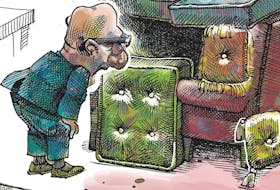It was a curious Facebook message, asking for help.

But it was also a profound misunderstanding about how this province’s courts work.
Last week, the province began its appeal of a decision requiring the massive Grieg NL aquaculture project in Placentia Bay to undergo a full environmental assessment.
The Facebook message? “We have learned via the Mayor of Marystown that the Chamber of Commerce of Marystown will be attending the court case to show support for the provincial government and Grieg. So I cannot stress enough how important it is that we have people in court showing support for our side to balance their presence.”
I don’t mean to be a killjoy, but being part of that crowd is a waste of time.
In fact, being part of any crowd inside or outside a courtroom is a waste of time, at least if what you’re trying to do is sway the outcome of a particular case.
Because our courts don’t work that way, and you’d better hope they never do.
Some might argue that the courts should be responsive to public opinion: I wish those people would step back and think about what a judicial system based on public sentiment could, and would, be like in the long term.
Make no mistake: any judge knows that protesters are there. In all the courts I’ve ever been in, the judge is looking straight out at the courtroom. And judges are smart people: they wouldn’t have their jobs if they weren’t. They know when there’s a crowd, and they know exactly what case that crowd’s wound up about.
But that doesn’t mean a protester will affect a court’s decision.
Cases are decided on the facts, and are successfully appealed based on errors in law, not based on the number of people who object to a verdict.
And that’s the way it should be.
Here’s Justice Minister Andrew Parsons, talking about the process in the Crown’s decision to appeal the sentence in the recent assault case, where Lancelot Saunders was given an absolute discharge after assaulting his ex-girlfriend, Aden Savoie. Saunders got the absolute discharge after the judge in the case took into account his plans for university.
“I’m certainly cognizant of the feedback that’s out there on social media, and I take this all in, but these decisions are made on a legal basis, and the Crown attorneys in this matter, and our director of public prosecutions would have looked at the matter, looked at everything that made it up, and then made that decision to proceed,” Parsons told the CBC.
The judge can’t, and won’t and shouldn’t, take into account how many supporters someone brings with them to the courtroom, even if all of those supporters are wearing T-shirts announcing their support.
In other words, Parsons didn’t intervene based on public outrage about the verdict, and justice officials didn’t decide to file an appeal based on that outrage either. The appeal went ahead because the Crown thought demonstrable legal mistakes had been made — and that’s absolutely the way it should be.
Popular protest has a critical part to play in making sure that the justice system changes with the views of the population it serves. But protest works for making that change in the political arena — as it should.
It works on the legislative branch, so that politicians change laws — not on the judiciary, which makes decisions based on the law.
The judge can’t, and won’t and shouldn’t, take into account how many supporters someone brings with them to the courtroom, even if all of those supporters are wearing T-shirts announcing their support.
It doesn’t matter to the legal process if there are noisy protests outside the courthouse, or if eggs are being thrown or graffiti sprayed. What matters are the facts of the case.
I’d take it a little further: if you could find a case where the judge’s decision was demonstrably swayed by protests outside the court in any way, that’s a judge who should no longer be on the bench.
Think of it this way — do you want a judge to decide your fate based on the merits of a case and the sworn evidence presented in court, or would you prefer to have justice dispensed by popular opinion and the mob outside?
Real trial or show trial?
Because the court of public opinion is harsh and arbitrary, and quite often doesn’t even have its basic facts straight.
Russell Wangersky’s column appears in 35 SaltWire newspapers and websites in Atlantic Canada. He can be reached at [email protected] — Twitter: @wangersky.








